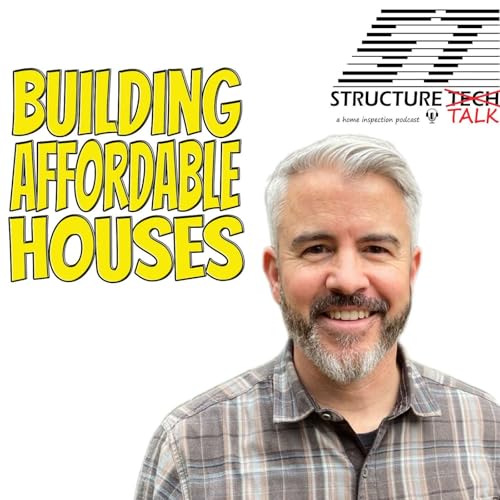To watch a video version of this podcast, click here: https://youtu.be/0US0bHGynQo
In this episode, Reuben Saltzman and Tessa Murry once again welcome Structure Tech’s Service Manager, Eric Houseman, for a deep dive into one of the most debated topics in home inspections: flashing and exterior water management.
Prompted by an email from fellow home inspector Chris, the discussion explores real-world challenges with flashing details, siding clearances, and the gap between best practices and industry standards. The episode highlights why these details are often overlooked, how that impacts homes, and what inspectors and homeowners should know to avoid costly hidden damage.
Here's the link to Inspector Empire Builder: https://www.iebcoaching.com/events
Takeaways
“No damage yet” is not a valid reason to ignore improper flashing—problems can take years to surface.
You often cannot confirm the absence of damage without intrusive inspection, so assumptions are risky.
Even small, undersized, or poorly angled kick‑out flashings can increase water intrusion potential.
Head flashing/drip caps above windows and doors are universally required by manufacturers—even if local builders claim otherwise.
Context matters: overhangs, siding type, wall assembly, and home age affect how serious missing flashing is.
Water‑resistant barriers and tape alone cannot replace properly installed rigid flashing.
When in doubt, report the defect clearly and let the builder or homeowner decide the next steps.
Home inspectors must balance clarity, liability, and real‑world practicality when writing reports.
Builder and agent pushback is common—but manufacturer instructions are the ultimate authority.
Good bedside manner and client communication can prevent inspectors from being labeled “deal killers.”
Chapters
00:00 Intro and episode setup
00:27 Welcoming back Eric Houseman
00:56 Show sponsor: IEB
01:40 Listener Chris’s email and the topic of exterior water‑management defects
02:47 Question 1: Kick‑out flashing
05:23 Undersized or improperly angled kick‑outs
06:15 “There’s no damage—why mention it?”
08:06 When and why Structure Tech calls out inadequate kick‑outs
09:43 Real‑world builder behavior and simple fixes
11:11 How wording in reports focuses on increased potential for problems
12:10 Balancing best practice and liability
13:53 Question 2: Drip caps and head flashing
17:12 Why windows and openings universally require rigid flashing
18:37 Builder pushback: “It’s not required.”
21:07 What siding manufacturers expect (and why it matters)
24:03 Considering home age, siding type, and overhangs
25:46 A continuum of concern: stucco vs. vinyl
28:08 How Structure Tech phrases drip‑cap comments
29:12 Question 3: Z‑flashing, drainage gaps, and siding clearance
31:57 Manufacturer requirements vs. real‑world installations
32:46 Structure Tech’s canned report language
36:57 Should you mention missing kick‑outs on older homes? (Yes.)
38:48 Reuben’s personal stucco repair story
41:25 Why missing flashing matters even on pre‑1990s homes
41:43 How to respond when builders say “No other inspector reports this”
45:13 Handling pushback and the “deal killer” label
47:26 How agents affect deal perception
51:11 Improving client experience and reducing anxiety
52:59 Understanding client “pain tolerance.”
54:24 Closing thoughts and invitation for listener feedback
 56 m
56 m 33 m
33 m 37 m
37 m Jan 12 202639 m
Jan 12 202639 m 37 m
37 m 48 m
48 m Dec 1 202550 m
Dec 1 202550 m Nov 24 202552 m
Nov 24 202552 m
